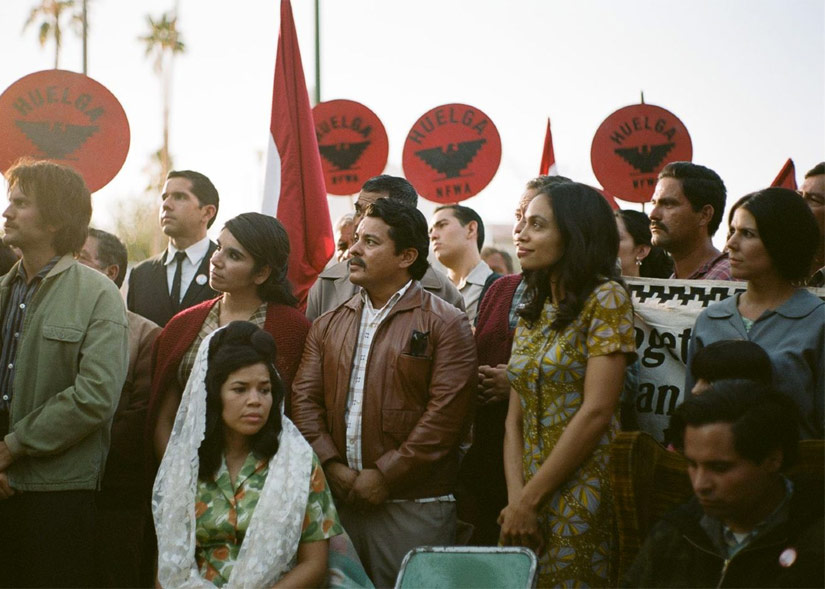[To commemorate the limited theatrical release of Cesar Chavez, we are re-posting this review of the film from this year’s South by Southwest.]
[youtube id=”Zra1pBOOOJc”]
Cesar Chavez
Director: Diego Luna
Rating: N/A
Release Date: March 10, 2014 (SXSW)
Cesar Chavez was not only one of the largest and most influential icons in Latino culture, he was also one of the premier faces of the civil rights movement during the 1960s. Yet, director Diego Luna’s portrayal of the labor leader’s life is the first time Chavez’s story has been put on the big screen. Why is that? I’m not entirely sure, but because of the gravity behind the film and how important Chavez was to many people, Cesar Chavez, the film, carries an added layer of spectacle. Because of this, it’s a bit difficult to view Cesar Chavez from an objective perspective, yet its the subjectivity behind his story that will ultimately drive the film’s success… or failure.
Much like all other biopics, Cesar Chavez is a fictional take on Cesar Chavez’s (Michael Peña) life, spotlighting some of the major events Chavez went through, such as the formation of the United Farm Workers union, the Delano grape strike, the Modesto March, and one of Chavez’s many fasts. By his side are his wife, Helen (America Ferrera), and Dolores Huerta (Rosario Dawson), another pivotal figure in the formation of the UFW. Within the context of the film, the main source of conflict for Chavez comes in the form of one grape farm owner (John Malkovich) who unites other farm owners to resist Chavez’s demands for proper treatment of their contract workers. Another subplot involves the alienation between Chavez and his oldest son, creating a dichotomy between the love he received from the public, but the backlash he was receiving privately.
As I mentioned in my introduction, Cesar Chavez was one of the most important Latinos in American history… nay, one of the most influential cultural icons in history. Because of this, expectations will be high for audiences watching Cesar Chavez that may affect how the film is received. On the one hand, it’s about time Chavez’s life was immortalized on the silver screen. At the same time, I feel like the film will be more positively received because of who Chavez was rather than by the merits of the film itself. Cesar Chavez isn’t a bad film. In fact, I think it highlights Michael Peña’s true talents as an actor. However, a part of that could come from the very fact that he’s portraying Cesar Chavez, yet it takes a certain ability to portray such an iconic figure. Do you sense the catch-22 I’ve been struggling with here?
Cesar Chavez isn’t a bad film, but it doesn’t necessarily stick out. Luna’s depiction of Chavez’s plight is great, fitting perfectly within the framework of a film, but like all biopics, reception is mostly based on the audience’s familiarity with the figure. The conflict is resounding enough for audiences to be drawn to, and there are certainly going to be audiences cheering on with “Se se puede!” chants, but those will mostly come from the independent theaters. Cesar Chavez is one of the most important luminaries of the civil rights movement and Latino community, and while Cesar Chavez is a solid film that encapsulates a part of this amazing man’s life, it’ll unfortunately be overshadowed by the spectacle of the fact.

